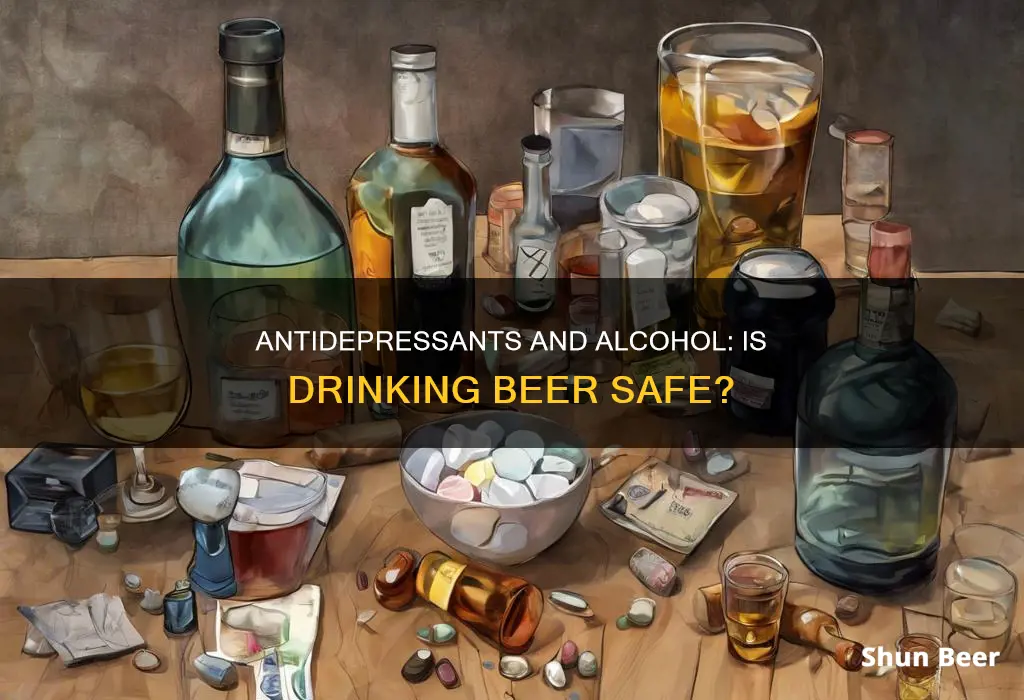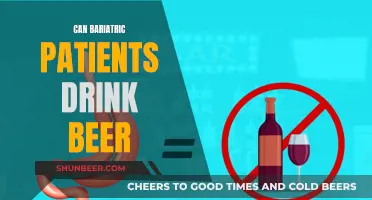
Drinking alcohol while taking antidepressants is not recommended. Both alcohol and antidepressants affect the brain, and when combined, they can have serious side effects and health risks. Alcohol can worsen the symptoms of depression, making it more difficult to treat. It can also increase the risk of overdose and worsen side effects such as drowsiness, dizziness, and impaired motor control. Additionally, alcohol can reduce the effectiveness of antidepressants, creating a dangerous situation where depression worsens and the medication stops working as well as it should. In extreme cases, mixing alcohol and antidepressants can even lead to violent behaviour, suicidal thoughts, and death.
| Characteristics | Values |
|---|---|
| Is it safe to drink beer on antidepressants? | No, it is not recommended to mix alcohol and antidepressants. |
| Why? | It can cause minor reductions in the effectiveness of the medication or cause serious health risks. |
| Alcohol can worsen symptoms of depression, making it harder to treat. | |
| It can increase the risk of overdose. | |
| It can increase the risk of and worsen side effects, such as drowsiness, sedation, dizziness, impaired motor control, and intensified depressive moods/thoughts | |
| It can lead to dangerous spikes in blood pressure. | |
| It can increase suicidality. | |
| It can be fatal. |
What You'll Learn
- Drinking alcohol while on antidepressants can worsen depression and make it harder to treat
- Alcohol and antidepressants can cause dangerous interactions and side effects, including drowsiness, dizziness, and an increased risk of overdose
- The combination of alcohol and antidepressants can lead to impaired judgement and coordination, which may result in accidents and injuries
- Alcohol interacts with the neurotransmitters in the brain, inhibiting the exchange of neurotransmitters and altering brain function
- While small amounts of alcohol may be safe with certain antidepressants, it's important to consult a doctor to understand the potential risks and side effects

Drinking alcohol while on antidepressants can worsen depression and make it harder to treat
Drinking alcohol while taking antidepressants can have serious consequences for your health and well-being. Alcohol is a depressant, which means it can intensify the very symptoms of depression that your medication is trying to treat. It can also negatively interact with antidepressants, reducing their effectiveness and making your depression harder to treat.
Firstly, alcohol can worsen your depression. As a depressant, alcohol can intensify feelings of depression and anxiety. This is true whether you are taking medication or not. Alcohol suppresses neurological signals, altering your ability to think and reason, and can send you into a downward spiral in terms of your mental health. It can make symptoms of depression, such as feelings of worthlessness, tiredness, insomnia, and weight gain or loss, even worse.
Secondly, alcohol can negatively interact with antidepressants. Antidepressants are designed to manipulate the chemical balance in the brain. When you drink alcohol, both substances create an effect in the brain, and this effect is often harmful. This is because prescription medication is not meant to be altered by other substances. Alcohol can reduce the effectiveness of your medication and increase the risk of and worsen side effects, such as drowsiness and dizziness. It can also increase your risk of overdose.
The combination of alcohol and antidepressants can also be fatal. Alcohol changes the way antidepressants work, making them less effective, and it can also increase suicidality in connection with worsened depression. Alcohol may also increase thoughts of suicide, as depression already puts you at a higher risk of suicide.
If you are taking an SSRI (selective serotonin reuptake inhibitor) such as Lexapro or Zoloft, you should know that alcohol can make the side effects of these drugs worse. SSRIs are the most commonly prescribed type of antidepressant and work by stopping the brain from absorbing serotonin at its usual rate, so that a surplus of this "feel-good" chemical is created, leading to a more sustained "feel-good" response. However, alcohol inhibits the neurotransmitter exchanges in your brain, complicating the effects of SSRIs. These complications are called interactions.
If you are taking an MAOI (monoamine oxidase inhibitor), a less commonly prescribed type of antidepressant, drinking alcohol is especially risky. MAOIs increase levels of an amino acid called tyramine in the body, and too much tyramine can cause dangerous spikes in blood pressure. Alcohol increases this problem and can even be fatal.
If you are taking antidepressants, you should not drink alcohol. If you are struggling with alcohol use, you should seek professional support.
Beer and Crohn's: What's Safe to Drink?
You may want to see also

Alcohol and antidepressants can cause dangerous interactions and side effects, including drowsiness, dizziness, and an increased risk of overdose
Alcohol and antidepressants can have dangerous interactions, and it is never recommended to mix the two. The side effects of antidepressants can be made worse by drinking alcohol, and the combination can lead to an increased risk of overdose, as well as drowsiness and dizziness.
Alcohol is a depressant, and as such, it can intensify the depression that is being treated with prescription antidepressants. It can also impair your motor control and lower your inhibitions, which can be extremely dangerous if you are experiencing suicidal thoughts or tendencies.
Drinking alcohol while taking antidepressants can also lead to more severe side effects from the medication, including drowsiness and sedation. This is because both substances have a sedative effect, slowing down the central nervous system and causing poor coordination. The combined effect of both substances can lead to accidents and injuries.
In addition, alcohol can reduce the effectiveness of antidepressants, interfering with their ability to treat depression. This can lead to a dangerous cycle where the person becomes more depressed and increases their alcohol consumption as a result.
The combination of alcohol and antidepressants can also alter your thinking and judgment, leading to poor decisions and potentially self-destructive behaviours. It can also increase the risk of developing a co-occurring substance use disorder.
Finally, mixing alcohol with certain types of antidepressants, such as monoamine oxidase inhibitors (MAOIs), can be especially dangerous and even life-threatening. MAOIs increase the levels of the amino acid tyramine in the body, and when combined with alcohol, can cause dangerous spikes in blood pressure.
If you are taking antidepressants, it is important to avoid alcohol completely and seek professional support if you are having a hard time stopping drinking.
Drinking NA Beer: Safe Driving or Legal Trouble?
You may want to see also

The combination of alcohol and antidepressants can lead to impaired judgement and coordination, which may result in accidents and injuries
Drinking alcohol while taking antidepressants can be dangerous and lead to impaired judgement and coordination. This is because both substances alter the way your brain functions. Antidepressants are designed to manipulate the chemical balance in the brain, and alcohol has a similar effect, inhibiting the neurotransmitter exchanges in your brain. This is why people often experience impaired judgement and coordination when drinking.
When you combine alcohol and antidepressants, the effects of both substances are heightened. You may get drunker faster and experience more intense drowsiness or sedation. This can lead to accidents and injuries, especially if you are doing something that requires alertness and coordination, such as driving or operating machinery.
The combination of alcohol and antidepressants can also increase the risk of overdose and worsen side effects such as dizziness and drowsiness. It can also lead to more serious health issues, such as liver damage and cardiovascular problems. In extreme cases, mixing alcohol and antidepressants can be fatal, leading to alcohol poisoning or even suicide.
Even if you are taking antidepressants for a condition other than depression, such as OCD or PTSD, drinking alcohol may still not be safe. This is because depression is a common symptom of these conditions, and alcohol can worsen depressive symptoms. Therefore, it is generally recommended to avoid alcohol completely while taking antidepressants. If you are struggling with alcohol abuse or dependence, it is important to seek professional help.
Hamsters and Beer: What's Safe to Drink?
You may want to see also

Alcohol interacts with the neurotransmitters in the brain, inhibiting the exchange of neurotransmitters and altering brain function
Antidepressants are commonly prescribed to treat depression, but they can also be used to treat other conditions, such as obsessive-compulsive disorder, generalized anxiety disorder, post-traumatic stress disorder, or certain types of chronic pain. While they can be effective, it is important to be aware of the dangers of mixing antidepressants with other substances, such as alcohol, as it can lead to harmful interactions and serious health risks.
Additionally, alcohol can enhance the sedative effects of antidepressants, increasing the risk of drowsiness and impaired coordination. This combination can lead to accidents and injuries, especially when performing tasks that require alertness and concentration. The interaction between alcohol and antidepressants can also result in more severe side effects, including increased risk of overdose and dangerous spikes in blood pressure, which may require emergency medical attention.
Furthermore, alcohol can worsen the symptoms of depression, making it more challenging to treat. It can alter the balance of chemicals in the brain, leading to intensified depressive moods and thoughts. This can create a vicious cycle, as the increased depression may lead to increased alcohol consumption, further exacerbating the problem.
In conclusion, the interaction between alcohol and antidepressants is complex and can have significant impacts on brain function and overall health. It is crucial to understand the risks associated with mixing these substances and to seek professional advice before consuming alcohol while taking antidepressants.
Beer and Aleve: A Safe Mix?
You may want to see also

While small amounts of alcohol may be safe with certain antidepressants, it's important to consult a doctor to understand the potential risks and side effects
Drinking alcohol while taking antidepressants is not recommended, as it can be dangerous and lead to serious health risks. Alcohol can worsen symptoms of depression, making them more difficult to treat. It can also increase the risk of overdose and worsen side effects of antidepressants, such as drowsiness or dizziness. However, small amounts of alcohol may be considered safe with certain types of antidepressants.
Selective Serotonin Reuptake Inhibitors (SSRIs) are the most commonly prescribed type of antidepressant. They are often the first line of treatment for depression and anxiety due to their relatively lower risk of side effects. Common SSRIs include Prozac, Zoloft, Lexapro, Celexa, Luvox, and Paxil. While small amounts of alcohol are generally considered safe with SSRIs, it's important to note that alcohol can still enhance the side effects of these medications. For example, both alcohol and SSRIs like Lexapro can cause drowsiness, and combining the two may increase this effect.
Serotonin and Norepinephrine Reuptake Inhibitors (SNRIs) are another type of antidepressant that works similarly to SSRIs. Common SNRIs include Strattera, Pristiq, Cymbalta, Fetzima, Ultram, and Effexor XR. Small amounts of alcohol are generally considered safe with SNRIs, but binge drinking can lead to worsening depressive symptoms and increased intoxication effects.
Tricyclic/Tetracyclic Antidepressants (TCAs) are older medications that are less commonly used today due to their lower margin of safety and more unpleasant side effects. Common TCAs include Elavil, Anafranil, Sinequan, Tofranil, Surmontil, and Norpramin. Alcohol, especially in large amounts, is not compatible with TCAs. It can worsen liver damage and increase the risk of dangerous spikes in blood pressure.
Monoamine Oxidase Inhibitors (MAOIs) are also older medications that are rarely prescribed due to the risk of adverse drug interactions and severe side effects. Common MAOIs include Azilect, Eldepryl, Zelapar, Marplan, Nardil, and Parnate. Mixing alcohol with MAOIs is very risky and can lead to dangerously high blood pressure, which may be fatal.
Atypical Antidepressants, such as Wellbutrin, Mirtazapine, Bupropion, Trazodone, Nefazodone, and Agomelatine, do not fit neatly into the other categories and require medical consultation before drinking. Mixing alcohol with Wellbutrin, for example, can increase the risk of seizures.
It's important to consult a doctor before consuming alcohol while taking any type of antidepressant to understand the potential risks and side effects. The effects of mixing alcohol and antidepressants can vary depending on the brand and the individual. Additionally, drinking alcohol is not recommended for people with depression, as it can alter brain chemistry and worsen symptoms.
Goats and Beer: A Curious Mix?
You may want to see also
Frequently asked questions
No, it is not recommended to drink beer or any other form of alcohol while taking antidepressants. Alcohol can cause an increase in the side effects of antidepressants, such as drowsiness, and can also lead to serious health risks and even fatal consequences.
The side effects of drinking beer while on antidepressants can include intensified depressive moods and thoughts, impaired motor control, and an increased risk of overdose. Alcohol can also reduce the effectiveness of antidepressants, impair your thinking and judgement, and increase the risk of addiction.
If you are taking antidepressants and want to drink beer, you should first consult your doctor for medical advice. It is important to understand the potential risks and side effects of mixing alcohol with your specific medication. Abruptly quitting drinking can also result in dangerous withdrawal symptoms, so it is important to discuss this with your doctor.







